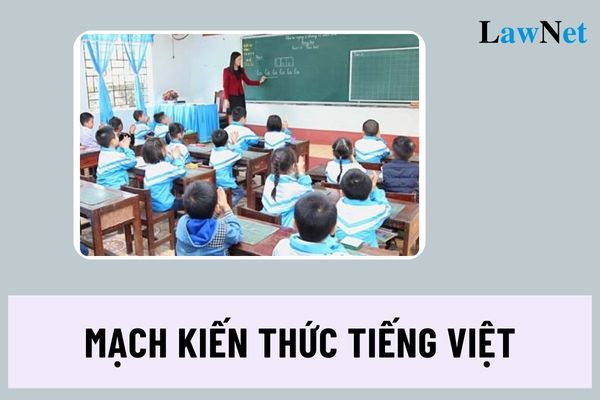How many Vietnamese language knowledge strands are there? What are regulations on allocation of Vietnamese language knowledge strands at the primary school level?
How many Vietnamese language knowledge strands are there?
Based on Section V of the General Education Program for the Vietnamese Language subject issued together with Circular 32/2018/TT-BGDDT, there are 4 knowledge strands in Vietnamese Language Studies:
- Literary Theory: some practical issues of literary theory, closely related to literary text comprehension.
- Literary Genres: stories, poetry, drama, memoirs, and some typical genres.
- Elements of Literary Texts: story, plot, character, space, time, narrator, perspective, rhyme, rhythm, etc.
- Literary History: some major authors and an overview of the history of Vietnamese literature summarized at the end of secondary school and high school levels.
>> See the General Education Program for the Vietnamese Language subject issued together with Circular 32/2018/TT-BGDDT: Download

How many Vietnamese language knowledge strands are there? What are regulations on allocation of Vietnamese language knowledge strands at the primary school level? (Image from the Internet)
What are regulations on allocation of Vietnamese language knowledge strands at the primary school level?
According to the provisions of Section V of the General Education Program for the Vietnamese Language subject issued together with Circular 32/2018/TT-BGDDT, the Vietnamese language knowledge strands are allocated in primary education as follows:
Some basic understanding of phonetics, writing, vocabulary, grammar, communication activities, and language variations (language combined with imagery, data); the ability to recognize and initially understand related linguistic phenomena and apply them in communication.
Can children in Vietnam attend first grade early if they do not meet minimum age requirement?
According to Article 28 of the Education Law 2019, the levels and ages of general education are specified as follows:
- The levels and ages of general education are prescribed as follows:
+ Primary education in Vietnam is implemented in 5 school years, from grade one to the end of grade five. The age for students to enter the first grade is 6 years old and is calculated by year;
+ Lower secondary education in Vietnam is implemented in 4 school years, from grade six to the end of grade nine. Students entering the sixth grade must complete the primary education program. The age for students to enter the sixth grade is 11 years old and is calculated by year;
+ Upper secondary education in Vietnam is implemented in 3 school years, from grade ten to the end of grade twelve. Students entering the tenth grade must have a lower secondary school diploma. The age for students to enter the tenth grade is 15 years old and is calculated by year.
- Students allowed to skip grades, study at an age higher than the prescribed age at clause 1 of Article 28 of the Education Law 2019 include:
+ Students skip grades in cases of early intellectual development;
+ Students study at an age higher than the prescribed age in cases of students repeating a grade, students in particularly difficult socio-economic conditions, students of ethnic minorities, students with disabilities, students with poor physical or intellectual development, orphans without guardians, students from poor households, students returning from abroad, and other cases as prescribed by law.
- General education in Vietnam is divided into the basic education phase and the career-oriented education phase.
The basic education phase includes primary education and lower secondary education; the career-oriented education phase is upper secondary education.
Students in vocational education institutions can study high school cultural knowledge.
At Article 33 of the Primary School Charter issued together with Circular 28/2020/TT-BGDDT also stipulates the age of primary school students, specifically:
- The age for students to enter the first grade is 6 years old and is calculated by year. Disabled children, those with poor physical or intellectual development, children in areas with particularly difficult socio-economic conditions, children of ethnic minorities, orphans with no guardians, children returning from abroad, and children of foreigners studying or working in Vietnam can enter the first grade at an age higher than the prescribed age but not exceeding 3 years. In case children enter the first grade exceeding the prescribed age by more than 3 years, the decision will be made by the head of the Education and Training Department.
- Primary school students study at an age higher than the prescribed age in cases of students repeating a grade, students in areas with particularly difficult socio-economic conditions, students of ethnic minorities, students with disabilities, students with poor physical or intellectual development, orphans with no guardians, students returning from abroad, and other cases as prescribed by law.
Therefore, typically according to the provisions of the law, students in Vietnam will enter the first grade at 6 years old. However, there are some special cases in which students can study early in cases of early intellectual development.
If children develop intellectually early, they may be allowed to enter the first grade early.
Note: Early enrollment of children into first grade may also depend on the regulations of schools in each place.

